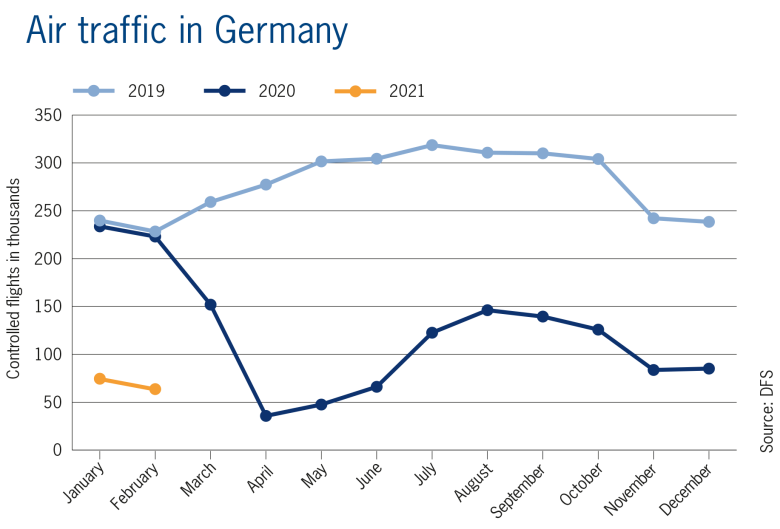
Air traffic volumes in Germany remain at a historically low level. In February 2021, DFS, the German air navigation service provider, logged almost 64,000 take-offs, landings and overflights under instrument flight rules (IFR).
In February 2021, traffic volumes in German airspace declined again slightly. DFS registered 63,689 take-offs, landings and overflights under instrument flight rules. This is about 10,000 fewer than in the previous month of January (74,543 aircraft movements). The year-on-year development looks different. Compared with the same month last year, February 2020, the drop is 71.5 percent. In January 2021, traffic volumes were down 68.1 percent on the prior-year month. "The gap to the previous year has widened somewhat. It is to be hoped that this trend will not continue and that the increase in the number of vaccinations in Germany and Europe will have the same positive effect on passenger booking behaviour as can already be observed in the United Kingdom," says Dirk Mahns, Chief Operating Officer and member of the DFS Executive Board.
Only 36,301 take-offs and landings were logged at Germany's designated international airports in February, almost as few as in January and 75.1 percent fewer than in the prior-year period. The pattern was uneven. Of the four major hub airports in Germany – Frankfurt, Munich, Berlin Brandenburg and Düsseldorf – Munich Airport continues to record the largest decline. In Munich, traffic in February was 88.4 percent below the previous year's level. The decline was significantly lower in Frankfurt (down 69.0 percent). Leipzig Halle Airport, a freight airport, once stands out. Here, traffic in February was only 12.7 percent below the prior-year period.
The overall decline was less pronounced at the regional airports. There, DFS registered 6,317 flights in February – 41.8 percent fewer than in the previous year. The busiest regional airport in February was Hahn Airport with 701 take-offs and landings (down 35.9 percent). It relegated the previous leader Dortmund Airport to second place. Dortmund logged 692 take-offs and landings, 61 percent fewer than in the same month last year.
Downloads
Media contact:
Kristina Kelek
Telephone: +49 (0)6103 707-4161
E-mail: presse@dfs.de
DFS Deutsche Flugsicherung GmbH, the German air navigation service provider, is a State-owned company under private law with 5,600 employees as at 31 December 2020. DFS ensures the safe and punctual flow of air traffic over Germany. Before 2020, around 2,200 air traffic controllers guided up to 10,000 flights in German airspace every day, more than 3 million movements every year. The company operates control centres in Langen, Bremen, Karlsruhe and Munich as well as control towers at the 16 designated international airports in Germany. The subsidiary DFS Aviation Services GmbH markets and sells products and services related to air navigation services, and provides air traffic control at nine regional airports in Germany and at London Gatwick Airport and Edinburgh Airport in the UK. R. Eisenschmidt GmbH is another DFS subsidiary which markets publications and products for General Aviation. Kaufbeuren ATM Training (KAT) is responsible for training military air traffic services personnel. DFS has been working on the integration of drones into air traffic since 2016 and has set up a joint venture, Droniq GmbH, with Deutsche Telekom.